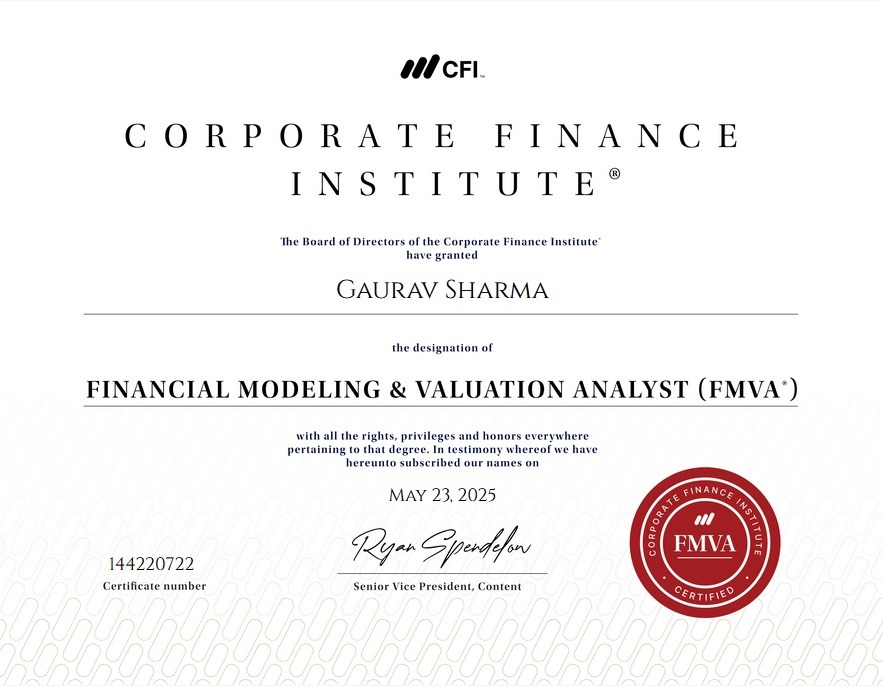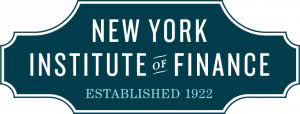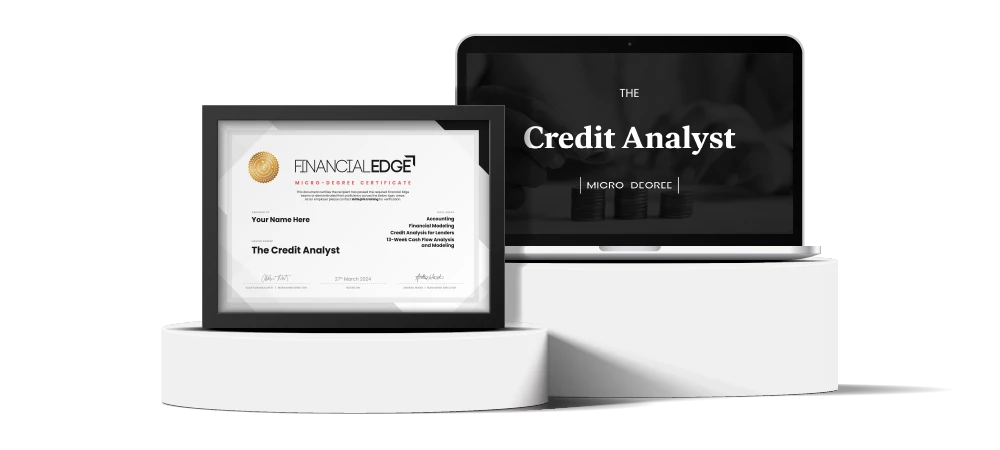Credit analysis forms the basis of corporate and retail lending as well as project finance, commercial real estate, debt capital markets and even retail portfolios. If you are interested in a role in credit risk management or credit analysis, then you need the right skills to be considered. This is a technical field and you need to know the jargon, the concepts of credit risk as well how to measure, manage and mitigate it.
Credit analysis is a financially rewarding and intellectually stimulating career choice with excellent growth prospects. I myself have done a lot of credit analysis during my banking days. If you are convinced that this is the career for you, then these courses will provide you the necessary practical knowledge to get started while giving a major branding boost to your CV.
1. The Credit Analyst Course from Financial Edge
(Note: Use code BBD25 for 25% off at Financial Edge)
Course Review
 Financial Edge is well known for in-house training for investment bankers at some of the world’s top investment banks. Now you can experience that same training online with this package. You will also be rewarded with a completion certificate once you successfully complete the course, and this carries significant weightage in the industry. Use it for personal branding, CV building and improving your LinkedIn profile. No better way to show your skill and expertise to potential employers.
Financial Edge is well known for in-house training for investment bankers at some of the world’s top investment banks. Now you can experience that same training online with this package. You will also be rewarded with a completion certificate once you successfully complete the course, and this carries significant weightage in the industry. Use it for personal branding, CV building and improving your LinkedIn profile. No better way to show your skill and expertise to potential employers.
It’s a comprehensive course which covers credit analysis from the perspective of lenders and includes across to core skills like modelling, handling financial statements, cash flow analysis, and even distressed debt restructuring. The core concepts are explained in videos by expert instructors with real world experience in banking. There are over a hundred practical exercises to get your groove on and build confidence.
The core credit course covers almost everything you need to know. From basics like the 5 Cs of credit, quantification of risk, risk measurement metrics to the measurement of debt capacity, estimation of business credit risk and mitigation and controlling methodologies. The best part is that this in not just theoretical or academic in nature. You actually get to learn how these are handled in the real world. During my first day as a credit analyst, all I wanted to know was how to write a credit memo. And that is the type of stuff that is covered here.
That practical focus obviously makes a lot of sense when you consider that this is the course that is given to actual bankers and credit analysts as part of their training. In addition to the credit risk topics, there are also a lot of modules covering modelling, dealing with financial statements and other foundational tasks. It’s not like you are dropped straight away into the deep end of the pool.
My personal favourite though is the stressed debt restructuring module. I have rarely seen this covered in other programs and it’s just something that feels fresh. All in all, expect a comprehensive and well-structured course design by industry pros that is delivered in an engaging format with plenty of practical exercises for you to chew on.
Click here and use code BBD25 for a 25% discount on all Financial Edge courses!
Summary
| Duration | Around 35 hours |
| Format | Fully online, on-demand |
| Level | Intermediate |
2. Professional Certificate in Credit Analysis from NYIF
Who should take this?
Recommended for credit analysts, corporate and retail bankers, fixed income professionals, credit derivatives or structuring roles, rating agencies professionals and lateral hires into credit roles.
Course Review
Finance is a highly competitive field with hundreds of candidates vying for a single role. You need something that makes you stand out. This is the best overall Credit Analysis certification available online. It takes about 35 hours of effort, is fully online and you will have a solid understanding of the topic and a nice, juicy certification to add on your CV and LinkedIn profile.
This course provides a comprehensive look at everything you need to know get started credit analyst. You start off with some foundational exploration of credit and risk principles. Then topics like credit risk terminologies, markets, participants, rating methodologies etc. are covered.
This is followed by an in-depth exploration of ratio and cash flow analysis. These are the numbers that we look at in banking to determine credit worthiness, exposure levels and even to price credit products.
Lastly, we have some detailed projections and structuring work, examples covering real-world companies and a final exam for the professional certification. Overall, its a decent combination of theory and practice.
This professional certificate offers excellent brand value. NYIF has been training bankers and traders for almost a century and this certification will enhance your credit risk credentials. Add it to your CV and LinkedIn profile if you are interested in a career in credit analysis or related roles.
Summary
| Duration | 20 hours |
| Format | Fully online, on-demand |
| Level | Intermediate |
3. Certified Banking & Credit Analyst (CBCA) from CFI
Who should take this?
Recommended for all credit, corporate, retail banking roles. Excellent brand value and recognition.
Course Review
The CBSA is the certification you want on your Resume if you are applying to a credit role. It is laser focused on credit analysis and risk and the Corporate Finance Institute has carved a niche for itself when it comes to this field. In my experience, such laser focused certifications always add value to your CV and makes it easier for the recruiter to shortlist and hire you.
One interesting aspect of this certification is that it caters to both beginners and intermediate users by adding a few optional prep courses for beginners. So if you are new to credit risk, you can go through these and build a foundational understanding. But if you already know a little bit about credit risk, you can skip these optional prep courses.
Topic coverage is as you would expect, including evaluating a business, assessing drivers of business growth, cash flow analysis, building a financial model, loan security and covenants, credit administration and documentation, account monitoring and warning signs, business writing and completing a credit application.
As someone with a over a decade of credit experience dealing with Fortune 100 clients, I can tell you this is really good stuff. This is pretty much all the skills we needed on the job and what I would want new hires to go through.

Overall, this is one of the best credit certification out there. The course content is delivered by experienced bankers and CFI has significant brand recognition in the financial services industry. The thing with such certifications is that they only gain additional brand value with time so completing them early in your career is something that I always recommend.
Click here and use code BBD10 for 10% off!
Summary
| Duration | 60 – 100 hours |
| Format | Fully online, on-demand |
| Level | Beginner to Intermediate |
4. Advanced Credit Risk Professional Certificate from NYIF
Who should take this?
Recommended for advanced credit roles at investment banks or mid-level positions at commercial banks.
Course Review
A more advanced version of the credit analysis course offered by NYIF. The Advanced Credit Risk Professional Certificate is recommended for credit professionals looking to up their game or those looking at non-entry level roles in credit risk. The curriculum is advanced enough for this course to be beneficial to bankers and senior level executives.
The course covers credits risk structuring and modeling, managing credit portfolios, capital allocations based on credit risk, credit derivatives like CDSs, CDOs and all that juicy stuff. This is an advanced course and it’s the course to take if you want to play in the big leagues.
If you are interviewing or interning for a mid level role in credit risk or trading or even an entry level role at the more discerning investment banks, then this is the certification you need on your CV.
Summary
| Duration | 5 days |
| Format | Fully online Virtual classroom |
| Level | Advanced |
5. Introduction to Credit Risk Management from TUDelft
Who should take this?
A good introductory course for beginners.
Course Review
 This is a basic introductory course for credit risk for learns who are completely new to the concept. It does not go into as much depth as the other ones, but it is a good starting point for those who are completely new to credit risk.
This is a basic introductory course for credit risk for learns who are completely new to the concept. It does not go into as much depth as the other ones, but it is a good starting point for those who are completely new to credit risk.
The course covers concepts like the definition of credit risk, risk regulations like Basel II and III, use of concepts like Value-at-Risk, expected shortfall, how credit ratings work, how to measure the probability of default of a counterparty, stress testing, credit depravities and so on.
This is a good theory course to learn the foundational concepts of credit risk. Its a decent entry point for students but for credit analysts, I would recommend one of the formal certifications listed above.
Summary
| Duration | 40 hours |
| Format | Fully online, on-demand |
| Level | Intermediate |
What to look for in a Credit Risk Course/ Certification?
- Brand Value – Recruiters spend roughly 7 seconds on a CV before moving on. Having solid brands on your CV is what will make it pop. You need to grab their attention and powerful branding lets you do just that.
- Timeline – You need the certification now, not 2-3 years down the line. This factors into my ranking.
- Quality – This one doesn’t need to be said, does it? Either way, I am specifically looking at courses that are accessible and highly relevant to real world corporate credit analysis.
Related Articles
- FMVA Certification
- Best M&A Courses
- Best Investment Banking Courses
- Best Project Finance Courses
- Best Financial Analysis Courses


